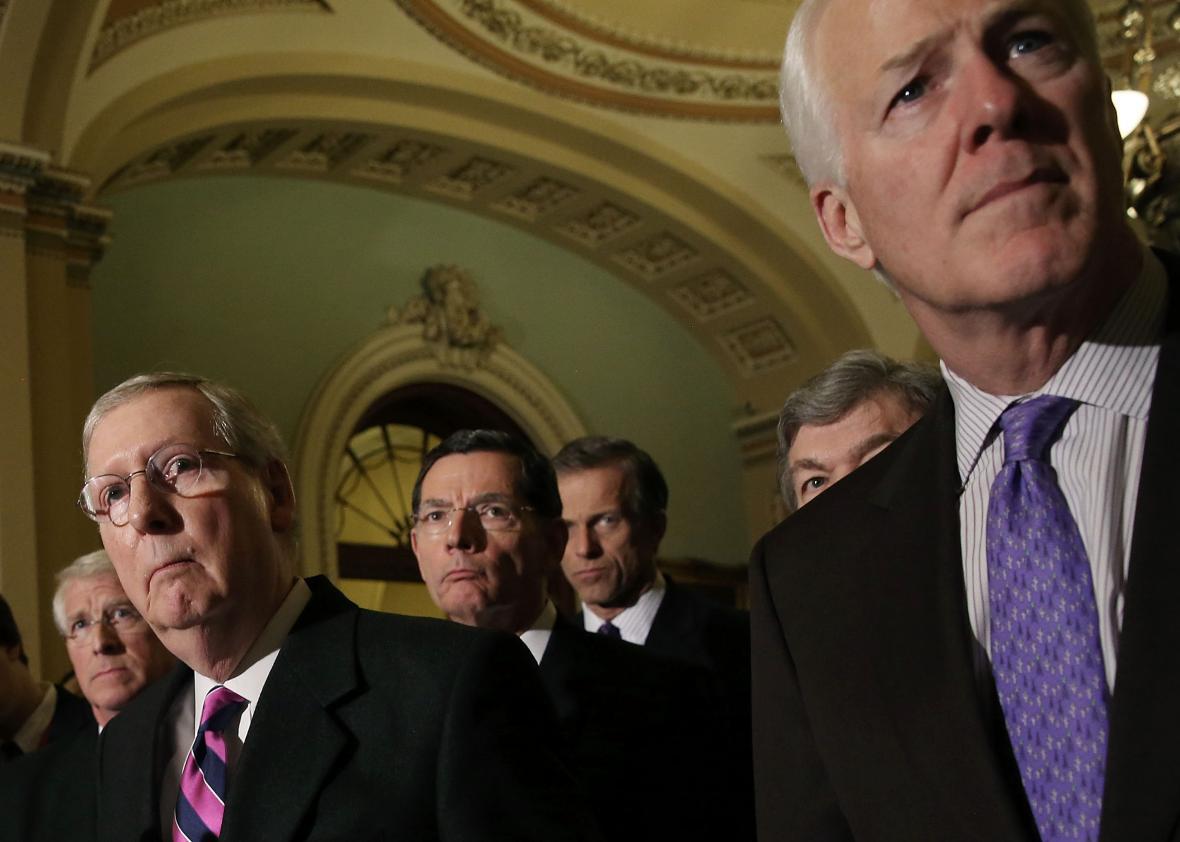The death of Supreme Court Justice Antonin Scalia on Saturday had barely moved beyond the realm of rumor before Senate Republicans announced that they would stonewall any replacement named by President Barack Obama. Senate Majority Leader Mitch McConnell—who controls much of the confirmation process—quickly declared that “this vacancy should not be filled until we have a new president.” Republican presidential contenders agreed at Saturday night’s debate, and the right-wing press jumped into action to pretend that blocking a Supreme Court nominee for 11 months is a time-honored American tradition. (It’s not.) Obama refused to play along, stating that he planned to fulfill his “constitutional responsibility to nominate a successor in due time.” Many Democrats, including Hillary Clinton, also employed the “constitutional responsibility line” to imply that the Senate would be shirking its Article II duties by obstructing the appointment of a new justice.
Whatever the merits of the constitutional argument, the Republicans’ political strategy here is extremely risky. It makes some sense at first blush—better to roll the dice that a President Rubio or Bush will get to appoint Scalia’s successor—but completely falls apart upon further analysis. There are serious compromise candidates on the current shortlist, extraordinarily qualified moderates like Sri Srinivasan who would likely refuse to overturn treasured conservative precedents like Heller (establishing an individual right to bear arms) and Citizens United (allowing unlimited corporate electioneering). If the Senate confirmed a Srinivasan type now, it might have to swallow a slight liberal SCOTUS tilt—but it could, by and large, avoid dramatically altering the balance of the court.
If the Senate holds out until January 2017, however, it will be taking an astonishing gamble. Should voters send another Democrat to the White House in November, they just may turn the Senate blue again at the same time. At that point, the president could nominate a true liberal, in the vein of Justice Sonia Sotomayor—and Senate Democrats could revise the nuclear option and push him or her through over staunch GOP opposition. Once a Justice Goodwin Liu takes the bench, no conservative precedent would be safe. Goodbye Heller, goodbye Citizens United, goodbye McCutcheon and Hobby Lobby and maybe even the death penalty itself.
There are a few obvious caveats and retorts to this scenario. Most obviously, a Republican could win the presidency, keep the Senate red, appoint whomever he wants, and maintain the court’s previous balance. (My money is on Texas Supreme Court Justice Don Willett, whose charming affability belies his rock-ribbed conservatism.) Second, a Democrat could take the White House without turning the Senate blue, forcing a Srinivasan-type compromise candidate anyway. Third, even a Democratic Senate in 2017 could refuse to go nuclear and confirm a Supreme Court nominee with 50 votes, once again leading to the nomination of a moderate.
But are Republicans so confident in the likelihood of one of these alternatives that they’re willing to risk the worst possible outcome? Are they so horrified by the modest liberal victories that would come with the confirmation of a moderate as to deploy a strategy that could bring the second coming of the Warren court? And, just as critically, are they really certain that a presidential election entirely focused on the impact of the court on American life—as this one surely now will—plays to their advantage? Most Americans, after all, absolutely despise Citizens United and want to keep Roe v. Wade on the books. An election that focuses overwhelmingly on money in politics and first-trimester abortion is a losing election for Republicans.
Of course, the Republican strategy in the Obama era has been based on massive, unprecedented risks like this one, and the Senate stonewallers might just have the winning hand. But the odds that this particular gamble plays to their favor strike me as chillingly low. Already, Republican Sen. Lindsey Graham has begun to speak favorably about the possibility of a “consensus” candidate passing the Senate.* Expect to hear a growing din of chatter along these lines as more Republicans survey the political landscape and realize that the obstructionist path forward may also be the riskiest.
Correction, Feb. 14, 2016: This post originally misspelled Lindsey Graham’s first name.
